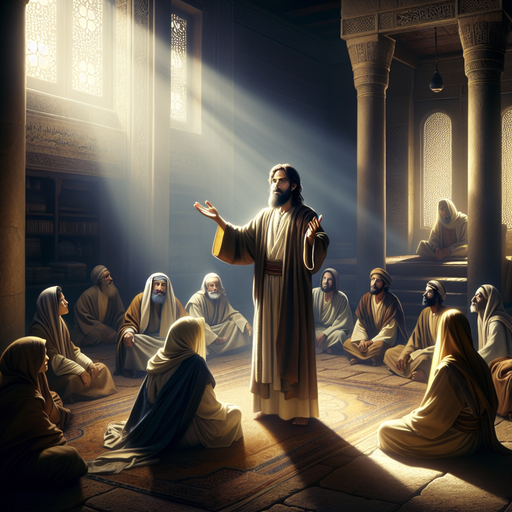In exploring the profound message of John 20:29, we delve into the essence of faith and belief beyond sight. This verse challenges us to reflect on the nature of trust in God and the blessings that come from believing without physical evidence. Join us on this enlightening journey. 
Understanding John 20:29: A Deep Dive into Faith and Belief
Have you ever wondered what it truly means to believe in something without seeing it? This concept is beautifully illustrated in the Bible, specifically in John 20:29. In this verse, we find a conversation that challenges our understanding of faith. Stick around as we explore this passage and uncover its significance in the lives of believers today.
What Does John 20:29 Say?
John 20:29 states, “Then Jesus told him, ‘Because you have seen me, you have believed; blessed are those who have not seen and yet have believed.’” This verse occurs after the resurrection of Jesus when He appeared to His disciples. It highlights a pivotal moment in which Thomas, one of the disciples, doubts the resurrection until he sees Jesus for himself. This short yet powerful verse emphasizes two groups of people: those who see and believe, and those who believe without needing physical evidence. The essence of John 20:29 lies in the blessing pronounced on those who have faith despite their inability to see.
The Context of John 20:29
To fully grasp the meaning of John 20:29, it’s essential to understand the context in which it was spoken. After Jesus rose from the dead, He first appeared to Mary Magdalene. Later, He revealed Himself to the disciples. However, Thomas was absent during His first appearance, leading to his skepticism when the other disciples recounted the event. Thomas famously declared, “Unless I see the nail marks in his hands and put my finger where the nails were, I will not believe.” (John 20:25). This doubt led to the very statement Jesus made in John 20:29, highlighting the struggle between faith and doubt.
The Importance of Belief Without Seeing
Why does Jesus emphasize belief without seeing? The answer lies in the nature of faith. In our modern world, it’s easy to rely on physical proof. We want tangible evidence before believing in anything. However, faith in God requires us to trust Him beyond what we can see. John 20:29 serves as a reminder that the most profound forms of belief often come without visible proof. It encourages individuals to cultivate a deep, trusting relationship with God, based on love and faith, rather than mere evidence.
Implications of John 20:29 for Today’s Believers
For many Christians today, John 20:29 has significant implications:
1. Embracing Spiritual Insight
Believers are called to seek spiritual insight that transcends the physical realm. This means trusting God in challenging situations, even when the outcome seems uncertain.
2. The Value of Community
Having a supportive community that shares their faith can help reinforce one’s belief. Just as Thomas had the other disciples sharing their experience with him, connecting with fellow believers can strengthen individual faith.
3. A Personal Journey
Each person’s faith journey is unique. While some may come to faith through experiences or answers to prayers, others may find themselves believing based solely on the testimony of others.
4. The Blessing of Believing
In John 20:29, Jesus declares that those who believe without seeing are blessed. This blessing is available to all believers, offering assurance that faith itself is a gift from God.
Moving Forward: How to Apply John 20:29 in Daily Life
Understanding John 20:29 is one thing, but applying its lessons is another. Here are practical steps to live out this verse in daily life:
1. Cultivate Your Faith
Spend time in prayer and reflection. Read the Bible regularly to deepen your understanding of God’s word. Engage with passages that inspire you, such as John 20:29.
2. Share Your Experiences
Don’t hesitate to share your own faith journey with others. Your story might encourage someone who struggles with belief.
3. Seek Community
Join a local church or participate in a Bible study group. Surrounding yourself with believers can provide support and foster an environment of encouragement.
4. Trust God’s Plan
When faced with uncertainty, remember the message of John 20:29. Trust in God’s plan, knowing that you are blessed for your faith.
Conclusion
In conclusion, John 20:29 challenges us to rethink our understanding of faith. It beautifully encapsulates the idea that true belief often comes without sight. Whether you find yourself in moments of doubt or unwavering faith, this verse serves as a beacon, guiding you toward a deeper relationship with Jesus. Embrace the blessing of believing without seeing, and watch how it transforms your spiritual journey.
Questions and answers on “Blessed are Those Who Believe: Unpacking the Message of John 20:29”
“`html
What is the significance of John 20:29 in Christianity?
John 20:29 states, “Then Jesus told him, ‘Because you have seen me, you have believed; blessed are those who have not seen and yet have believed.’” This verse highlights the importance of faith without physical evidence. It emphasizes that true belief is not dependent on seeing the miraculous but rather on trusting in Jesus’ message and presence.
2. How does John 20:29 relate to the concept of faith?
This verse illustrates the idea that faith is a vital component of the Christian experience. It reassures believers that even those who have not witnessed Christ physically can attain blessings through their faith, reinforcing the spiritual nature of belief.
3. What lessons can be drawn from John 20:29 for modern believers?
Modern believers can learn that faith often requires trust in the unseen and that believing without tangible proof is a cherished aspect of one’s spiritual journey. This teaches patience, perseverance, and strengthens community among those who share a common faith.
“`
biblebubbless
#God #Jesus #johnverse
Further thoughts on John 20:29
# Key Concepts in Christian Theology: Understanding John 20:29 Christian theology is a rich tapestry woven from Scripture, tradition, and the lived experiences of believers. One verse that resonates deeply within this context is **John 20:29**. This verse encapsulates key themes of faith, belief, and the nature of seeing versus believing. ### The Verse: John 20:29 In the **ESV**, John 20:29 reads, “Jesus said to him, ‘Have you believed because you have seen me? Blessed are those who have not seen and yet have believed.’” This statement was made by Jesus to Thomas, one of His disciples, after His resurrection. ### Commentary on John 20:29 The **commentary** on this verse often emphasizes the significance of faith without sight. Historically, Thomas exhibited doubt concerning Jesus’ resurrection until he personally encountered the risen Christ. Through Jesus’ words, believers are encouraged to have faith in what they cannot see, a pivotal concept in Christian theology. ### Meaning of John 20:29 The **meaning** of John 20:29 extends beyond Thomas’s immediate experience. It calls upon Christians to embrace belief without requiring physical evidence. This concept of “faith” is foundational in modern religious teachings and reflects the journey of many believers who find hope and truth in their spiritual lives despite not seeing tangible proof. ### Translations: NIV and KJV Different translations showcase the beauty of this message. In **NIV**, the verse states: “Then Jesus told him, ‘Because you have seen me, you have believed; blessed are those who have not seen and yet have believed.’” Similarly, the **KJV** states, “Jesus saith unto him, Thomas, because thou hast seen me, thou hast believed: blessed are they that have not seen, and yet have believed.” Each version retains the core message but offers nuances that can invite further reflection. ### A Sermon Perspective on John 20:29 In crafting a **sermon** around John 20:29, a pastor may explore how belief plays a crucial role in the life of a believer. Many contemporary sermons emphasize the idea that faith is a personal journey, one that often requires stepping into the unknown. Preachers might encourage congregants to trust in God during uncertain times as an expression of their faith, inspired by Thomas’s transformation from doubt to belief. ### Understanding through NKJV and Tagalog In the **NKJV**, the verse is rendered as: “Jesus said to him, ‘Thomas, because you have seen Me, you have believed. Blessed are those who have not seen and yet have believed.’” This translation aligns closely with the first two versions while still providing unique linguistic texture. For speakers of **Tagalog**, the verse translates to: “Sinabi sa kanya ni Jesus, ‘Dahil nakita mo Ako, naniwala ka. Pinagpala ang mga hindi nakakita at naniwala.’” This highlights the universal significance of faith, transcending language barriers and culturally affirming the notion that belief in God’s promises is vital to the Christian experience. ### Visual Representation: John 20:29 Images Accompanying the study of **images** depicting John 20:29 can enhance understanding, providing visual learners with insights into Biblical narratives. These images often depict Thomas’s encounter with the resurrected Christ, serving as powerful reminders of the transformational power of belief. ### Application in Daily Life The implications of **John 20:29** extend into the daily lives of believers. For many, this passage fosters resilience in face of challenges, encouraging individuals to rely on their faith when circumstances seem bleak. For example, someone experiencing grief may reflect on this verse, finding strength in believing God’s promises of eternal life, even if the answers to their questions remain unseen. Moreover, communities of faith often come together in prayer, reinforcing their beliefs collectively, echoing the sentiments expressed in this passage. Through shared worship and fellowship, believers experience the joy of faith that empowers them to live out their convictions. ### Conclusion In conclusion, **John 20:29** serves not only as a profound theological statement but also as an enduring encouragement to all believers. By embracing faith without always needing to see, Christians participate in a transformative journey that shapes their lives and communities. As the passage invites believers to reflect upon their own faith journeys, it remains a vital teaching for navigating the complexities of modern life. This verse truly encapsulates the essence of belief—a quality that defines the Christian experience and encourages hope, perseverance, and community in the lives of believers today.
